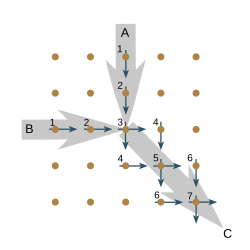
Calculating Space (German: Rechnender Raum) is Konrad Zuse's 1969 book on automata theory. He proposed that all processes in the universe are computational.[2] This view is known today as the simulation hypothesis, digital philosophy, digital physics or pancomputationalism.[3] Zuse proposed that the universe is being computed by some sort of cellular automaton or other discrete computing machinery,[2] challenging the long-held view that some physical laws are continuous by nature. He focused on cellular automata as a possible substrate of the computation, and pointed out that the classical notions of entropy and its growth do not make sense in deterministically computed universes.
YouTube Encyclopedic
-
1/3Views:5 1148 41320 914
-
Space Complexity | How to compute space complexity
-
Space Programming: Computation Table Basics
-
Computing Dimension of Null Space & Column Space
Transcription
See also
References
- ^ Zuse, Konrad (1967). "Rechnender Raum" (PDF). Elektronische Datenverarbeitung (in German). Bad Hersfeld, Germany. 8: 336–344. Archived (PDF) from the original on 2020-06-18. Retrieved 2022-08-02. (9 pages)
- ^ a b Mainzer, Klaus; Chua, Leon Ong (September 2011). The Universe as Automaton: From Simplicity and Symmetry to Complexity. Springer-Verlag. p. 6.
- ^ Müller, Vincent C. (January 2014). "Pancomputationalism: Theory or Metaphor?". In Hagengruber, Ruth; Riss, Uwe (eds.). Philosophy, Computing and Information Science. Pickering & Chattoo. pp. 213–221. Archived (PDF) from the original on 2021-10-21. Retrieved 2022-08-02.
Further reading
- Zuse, Konrad (1969). Rechnender Raum [Calculating Space]. Schriften zur Datenverarbeitung (in German). Vol. 1. Braunschweig, Germany: Friedrich Vieweg & Sohn. ISBN 3-528-09609-8. (70+4 pages)
- Zuse, Konrad (February 1970). "Calculating Space - Translation of: Rechnender Raum" (PDF). MIT Technical Translation. Translated by Aztec School of Languages, Inc. Cambridge, Massachusetts, USA: Massachusetts Institute of Technology. AZT-70-164-GEMIT (Project MAC). Archived (PDF) from the original on 2020-03-25. Retrieved 2020-03-25. (98 pages); Zuse, Konrad (2012). "Konrad Zuse's Rechnender Raum (Calculating Space)" (PDF). In German, Adrian; Zenil, Hector (eds.). A Computable Universe: Understanding & Exploring Nature as Computation (re-edition in LaTeX with permission of MIT and Zuse's family ed.). World Scientific. Archived (PDF) from the original on 2022-05-21. Retrieved 2022-08-02. (69 pages)
- Alex, Jürgen (2007). "Rechnender Raum". Zur Entstehung des Computers - Von Alfred Tarski zu Konrad Zuse [...] - Tertium non datur. Düsseldorf, Germany: VDI-Verlag. pp. 251–279. ISBN 978-3-18-150051-4. ISSN 0082-2361.
External links
- Jürgen Schmidhuber's site Zuse's book and 1967 paper.
- Calculating Space - a painting by Zuse - Konrad Zuse's visualization of the idea
- Web article and simulation of such a calculating space in C and LIBPNG
- SecondSpace Simulation of waves within a 2D space (time and space are discrete), similar to FDTD. An OpenCL graphic card is needed.
